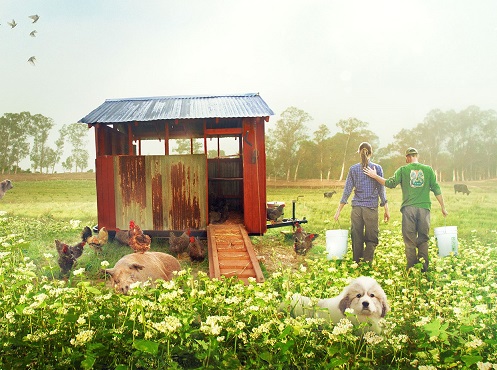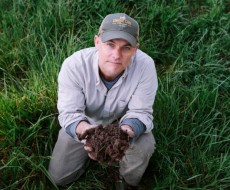『ビッグ・リトル・ファーム 理想の暮らしのつくり方』 ジョン・チェスター監督インタビュー
NeoL / 2020年3月13日 17時0分
[caption id="attachment_95045" align="alignnone" width="650"] Apricot Lane Farm April 2019[/caption]
カリフォルニア州に実在する広大な農場であるアプリコット・レーン・ファームが誕生するまでの日々を追ったドキュメンタリー映画『ビッグ・リトル・ファーム 理想の暮らしのつくり方』が、3月14日に日本公開される。自らカメラを回してその様子を映像に収めたのは、料理家の妻モリーと共にこの農場を始めたジョン・チェスター監督だ。大都会ロサンゼルスで暮らしていた夫妻は、愛犬の鳴き声が原因でアパートを追い出されたことをきっかけに、本当に体にいい食べ物を育てようと郊外に移り住む。映画は彼らと多くの仲間たちが大自然に翻弄されながらも、東京ドーム17個分の荒れ果てた土地で美しい農場を創り上げるまでの8年間を記録した。日本公開を前に、アプリコット・レーン・ファームにいる監督にスカイプインタビューを行い、本作に込めた思いを語ってもらった。(→ in English)
——ゼロから大規模な農場を始めるのはとても大変なことだったと思うのですが、同時にドキュメンタリーも制作されたことにびっくりしました。当初から映画を撮ろうと考えていたのですか?
ジョン・チェスター監督「最初から映画を制作する計画をしていたわけではありません。私は映画業界を辞めて本当に幸せだったのです。とはいえドキュメンタリーのフィルムメーカーでしたし、常に美しい画に魅了されていたので、『いつの日か物語を伝えたいと思うことが、もしかしたらこの農場にもあるかもしれない』と思いました。それで撮影を始めて、2年くらいして漠然としたアイデアは浮かんでいたのですが、5年目までは何もうまくいきませんでした。5年目になって、生態系の多様性が戻ったのです。タカがヘビを捕まえに来て、様々な捕食昆虫が害虫を減らしてくれるようになりました。私は意図的な自然の帰還に気づいて、それを記録したのです。そして、これは映画を制作するのに十分な説得力のある物語なのではないかと考えました。農場がうまく回り出した5年目のことです。それに(農場を構築する上で助けてくれた)アラン(・ヨーク)からは、『5年後には景色が変わってしまうから、早く撮影を始めた方がいいぞ!』と常に言われていました。いつもどれだけ美しい農場になるのか聞かされていたのです」
——都会で生活していると、ときどきキャンプをしたり、野外フェスティバルに行ったりして自然を楽しむことはあっても、すべてを捨てて自然の中で生活することはなかなか想像できません。監督にとっては、都会を離れて農場を始めるという決断は難しいことでしたか?
ジョン・チェスター監督「私は個人的に自然の中にいるのが好きなんです。メリーランド州の田舎の農村のような地域で育ったので、自分にとってはさほど難しい決断ではありませんでした。実は農場で働いた経験もあったのです。農業については何も知りませんでしたが、トラクターの運転方法や農具についてはわかっていました。それに野生動物のドキュメンタリーを撮っていましたからね。事前に予想していなかったのは、より楽な生活を求めて映画業界を去ったはずが、農場での暮らしは四六時中ノンストップだということです。最初の7年くらいは休みなく働きました。農場から出なかったので、かなり大変でした」


——映画業界を去った後、2度と映画を制作するつもりはなかったのですか?
ジョン・チェスター監督「当時の私は本当にやり切ったつもりでした。物語を伝える気が起きなかったのです。ある意味、行き先を見失っていました。ロサンゼルスにいるとそうなるんですよね(笑)。東海岸でドキュメンタリーを制作していたときは、LAのバブルの外にいて、より多くのインスピレーションを感じられました。でも一度ロサンゼルスのバブルに消費されてしまうと、すべてが以前ほど刺激的ではなくなるのです。私たちは常に意味や目的を追い求める人間であることを誇りに思っていました。そして妻のモリーと私は、つつましくて壊れやすい自然との真の絆を取り戻すことこそが、より豊かで複雑な意味や目的のある仕事だと気付いたのです。それは自分たちが気づかないうちに見失っていたものでした」
——映画の冒頭では土地がものすごく乾燥していたので、農場を作るなんて不可能なのではないかと思って観ていました。アランからあの土地を美しい農場にできると言われたときは信じられましたか?最初にあの土地を見たときの感想は?
ジョン・チェスター監督「正直に言って、最初にここに来たときは、他の多くの農場と比較して美しいと思っていました。でも、ものすごく乾燥していたのです。土壌がどれだけ死んでいたのかはわかっていませんでした。問題が土だとわかり、アランは『まずは土から取り掛かろう』『この土を生き返らせなければ』と話していました。土壌を作るのは植物です。植物が土壌を作るようにできています。この地域の農家は主に工業型農業で、作物の周りの植物(雑草)はすべて摘み取ってしまいます。作物と植物は競争関係にあると考えられているからです。でも実際には、土の栄養となるものは究極的には作物の栄養となり、農場全体の植物の健康をサポートする免疫システムを構築するのです」
[caption id="attachment_95050" align="alignnone" width="650"]

DCIM100GOPRO[/caption]

——最初に農場を始めた段階で、どこまでのビジョンを描いていましたか?
ジョン・チェスター「私たちは再生型の農場を運営したいと思っていました。再生というのは重要な言葉です。サステナブルという言葉には何の意味もないので、私たちは使いません。よく使われている言葉ですが、言葉の意味に対する条件すらないのです。サステナブルとは永遠に続くものということですよね。でも私たちの暮らす惑星はサステナブルな形で住まわれていません。それなのに、なぜいかなる農業についてもサステナブルなどと言えるのでしょうか?」
——農場を作るのを手伝ってくれたアラン・ヨークさんは、まるで哲学者のような人でしたね。彼から学んだ最も大きなレッスンは何でしたか?
ジョン・チェスター監督「モリーと私がアランや農業そのものから学んだ最も大切なことは、私たちの農業の方法は、物事の見方でもあるということです。システムがどのように機能しているかを理解して、自分たちが作り出した多様性を理解すれば、ツールがたくさん入った工具箱を手にしたようなものです。箱の中の何が必要となるかはわかりません。でもすべての自然を方程式に戻しさえすれば、害虫や病気が蔓延したシステムを管理することができます。アランはまた、好奇心が失敗したときに感じる恐怖や恥への解毒剤になるということを教えてくれました。なぜ悪いものは存在するのかという好奇心です。私たちは自分たちにとっての敵がどのような存在なのかを理解する必要があります。それができたら、よりよく協調することができて、農場と共存できる方向に優しく導けるようになるでしょう。それは心地よいレベルの不調和です。怖くて逃げ出したくなるようなことや、問題の原因を理解する前に焦って解決しようとしがちなことの中にこそ、機会を見出せるのです。それはすべてアレンの教えから始まりました。たとえばコヨーテにしても、簡単に13匹くらい殺すこともできたわけです。最終的に1匹は殺したのですが、なぜコヨーテが存在するのかを理解するまでに長い時間がかかりました。それを理解することによって、私たちはコヨーテに価値を見出せたのです。コヨーテの存在が農場に良いものをもたらしているという、複雑な状況を理解することができました。コヨーテはホリネズミやウサギや私が知らないようなものさえも管理してくれるのです。私たちは相手の存在を消す前に、なぜ存在するかを理解しなければなりません。きっと皆さんの職場にも、どうやったらうまく付き合えるのか誰にも見当がつかないようなコヨーテが1匹や2匹いるのではないでしょうか。でも彼らだって、何らかの形で役に立っているはずです(笑)」


——映画に記録された8年の間には、大変なこともあったと思います。諦めようと思ったことはありましたか?
ジョン・チェスター監督「もちろん、自分が失敗するだろうと思ったときはありました。モリーは諦めようと思ったことは一度もないそうです」
——モリーさんはとてもすてきな人ですね。
ジョン・チェスター監督「そうなんです!ハチドリのような人です。絶対に諦めないし、疲れを見せません。楽天的なんですよね。でも私が諦めようとしたときも、それはほんの一瞬でした。自分を頼りにしている農場や動物たちや作物がいるわけですから。彼らは子どものようなものですし、子どもたちを捨てて出て行くことなどできません。次の日も誰かが子どもたちを食べさせなければならないし、面倒を見なければならないのですから。諦めようとする度に、『でももし諦めるとしたら動物たちはどうしよう?』と思うのです。正直に言って、自分が追い出されるまで続ける方が楽です。もう一度トライしてみると、きっと何かが起こるはずです」
——農場で育つ息子さんを見ていて感じることはありますか?
ジョン・チェスター監督「息子はまだ5歳なのですが、先日ドライブしていたときに『パパ、僕はラッキーだよ』と言われました。『どうして?』と聞くと、『自然の中で大きくなれるから』と答えたのです。生態系に多様性のあるこの農場で暮らしていると、エコシステムのエンジンの中で暮らしているような気分になるので、息子のコメントを聞いてうれしくなりました。この農場に存在する様々なものが、ある種の調和を生み出すために協力し合っているということを理解しているのです。相利共生の生物学的な相関性の原則を理解しているわけです。5歳にしてそれがわかるなんて、かなりいいなと思います。35歳のときに理解できたらよかったなと思うくらいですし、ましてや5歳だなんて!だからこそ、私はこの映画を制作したのだと思います。相互接続したエコシステムというものが何を意味するのか、それを理解するための可能性として、親世代だけでなく、ぜひ子どもたちにも観てもらいたいです」
[caption id="attachment_95054" align="alignnone" width="650"]

Apricot Lane Farm April 2019[/caption]

——地球をより良い場所にするために、都会に暮らす私たちにもできることはありますか?
ジョン・チェスター監督「もちろんです。都市部ができる最も重要なことは、食品廃棄物を出さないことです。食品廃棄物は私たち農家が肥料として使える、限りある天然資源です。皆さんが廃棄しているものの中にはたくさんの栄養が含まれています。ですので、ベランダや庭でコンポストを始めたり、地域のコミュニティーにコンポストの回収プログラムを提案したり、地元の庭園やガーデニング同好会に残飯を寄付したりできたらいいと思います。私たちは食品廃棄物に含まれている価値のある栄養分を土に返したいのです。もしニューヨークでコンポストを始めたら、ネズミたちは食べ物がなくなって餓死するでしょうね。ネズミはニューヨークのコンポスターです。ゴミ袋からたくさんのゴミが溢れ出しているので、ネズミたちはそれを食べて生きているのです」
——この映画からは学べることがたくさんあるので、日本でもたくさんの人に観てほしいなと思います。
ジョン・チェスター監督「日本のファーマーによって書かれた『自然農法・わら一本の革命』という本があります。名前は覚えていないのですが(※福岡正信)、哲学的なファーマーです。ちょっと変わり者だと思われていたようですが、彼と私が共有しているのは、“自然の相関性は農家が何をすべきかを知らせる芸術形態であり、それが最終的に耕作方法を作り出す”という考え方です」
——今日はありがとうございました。豚のエマは今も元気ですか?
ジョン・チェスター監督「元気です!今はここから100ヤードほど離れた場所にいて、多分寝ていると思いますよ(笑)」

text Nao Machida
edit Ryoko Kuwahara
『ビッグ・リトル・ファーム 理想の暮らしのつくり方』
3月14日(土)、シネスイッチ銀座、新宿ピカデリー、YEBISU GARDEN CINEMA他、全国順次公開
synca.jp/biglittle/
監督:ジョン・チェスター 出演:ジョン・チェスター、モリー・チェスター
配給:シンカ
【2018/アメリカ/英語/91分/シネスコ/原題:The Biggest Little Farm】
(c) 2018 FarmLore Films, LLC
photo credit: Yvette Roman Photography
[caption id="attachment_95045" align="alignnone" width="650"]

Apricot Lane Farm April 2019[/caption]
——It seems difficult enough to start a farm, especially like your farm, and making a documentary is another difficult thing. Doing both at the same time seems insane, but were you planning to make a film from the beginning?
John Chester: No, I was not planning to make a film from the beginning. I really quite happily left the film business. But I was a documentary film maker and I was always fascinated by beautiful imagery, and I thought, “Well, maybe there are things one day I want to tell stories about on the farm.” So I started filming things, and I started kind of getting the idea after a couple years, but nothing was really working until year five. I saw all of the return of the biodiversity. You know, come back with hawks go for snakes, various predator insects that would predate on our pest insects. And I started realizing there was this purposeful return of nature, and I was documenting that, too. And that was the story that I thought would be compelling enough to make into a film. So it wasn't until year five that I decided that I actually had a real story to tell, because it started to work. And Alan used to always be like, "you better start filming this! It's not going to look like this in five years." He was always telling me how beautiful it was going to be.
——I live in the city and we sometimes go camping or rock festivals up in the mountain to enjoy nature, but I can't imagine leaving everything behind and living in nature. How difficult or easy was it for you to make that decision?
John Chester: For me personally, I really enjoy being in nature. I grew up in a very rural sort of farming community back in Maryland. So it wasn't a really big stretch for me, because I had actually worked on farms, too. But I didn't know anything about farming, I just knew how to drive tractors or I knew about various implements. Anyways, I liked it and also, I was working in nature photography and animal documentaries. I think what I didn't expect was that I thought I was leaving the film business for easier life. And this life is seven days a week, 24 hours a day. We didn't take any vacations for the first five or maybe almost seven years. We didn't leave the farm, so it was overwhelming enough.


——You had no intention to make another film when you left the industry?
John Chester: I was really done. I wasn't inspired to tell stories. I kind of lost my way. You know, Los Angeles would do that to you [laughs.] I was making documentaries on the East Coast and I was finding more inspirations from being outside of L.A., outside of the bubble. But once I got consumed by the Los Angeles bubble, everything seemed less inspiring. And what happened was that we always prided ourselves on being pursuers of meaning and purpose. And what Molly and I found was that our humble, vulnerable, true reconnection to nature makes meaning and purposeful pursuits even richer and more complex. And it was something we were missing that we had no idea we were missing.
——In the begging of the film, the land was so dry and I thought it was impossible to make a farm. When Alan told you that you could make a beautiful farm there, could you believe him? What did you think when you first saw the land?
John Chester: When we first got here, in comparison to a lot of other farms, we thought that was beautiful. But it was really, really dry. What we couldn't see was how dead the soil was. And we realized that the soil was a problem. Alan was like, "That's the first order of business," and he said "we have to bring this soil back to life." The way you build soil is plants. Plants build soil, that's how it works. And most of the farming in this area, industrial agriculture, kills any plant around the crop. Because they think it's in competition with the crop. And they think it causes the problem. In actuality, the thing that feeds soil ultimately feeds the crop plant, and also becomes the immune system that supports your plant health on the entire farm.
[caption id="attachment_95050" align="alignnone" width="650"]

DCIM100GOPRO[/caption]

——When you first started the farm, how much of a vision did you have?
John Chester: We knew we really wanted to work in a regenerative way. That's a really important word. We don't use the word "sustainable," because it doesn't mean anything. It's a word that gets used a lot, but there is no requirement for what the word even means. So sustainable is like it will last forever, it will sustain, right? Well the planet we live on is not being inhabited in a way that is even sustainable. So how can we say that agriculture of any form is sustainable? [laughs]
——You must have learned a lot from Alan York. He is almost like a philosopher and I was really moved by some of his words. What were some of the biggest lessons you got from Alan?
John Chester: I think the most important thing that Molly and I learned from him and from the farming practice itself is that our way of farming is a way of seeing. Once you are able to see the way that system works and the diversity you create, it's like basically having the tool box full of tools. You don't even know what you are going to need in that tool box. But as long as you bring all nature back to the equation, you now have things you can start to actually call on to help regulate your system that gets these epidemics of pest and disease. And he taught us how in the face of fear, the antidote to that fear that we feel during failure, the shame we feel during failure is curiosity. Curiosity for why the bad thing exists. You have to understand how the enemy works or how the thing that is working against you. How does it work? Why does it exist? There is a purpose. And once you understand that, you can better align with the way to sort of gently guide it in a direction that you and your farm can live with. It's a comfortable level of disharmony. And that all starts with what Alan taught us, and that is how to see the opportunities in the things that often times make us run in fear, or fix the problem too quickly before we understand why the problem exists. I could have very easily killed 13 coyotes, and eventually I killed one, but it took a long time to understand why the coyote existed. It helped me to value the coyote. It helped me to understand the complexity of its existence offered gifts to the farm. The coyotes regulate gophers and rabbits and other things that I may not even know. It's a pollinator. It's a seed propagator. And before we obliviate it, you need to take time to understand why it exists. And I'm sure anybody can say that there is probably a coyote or two in your work place that no one can figure out how to get along with. But somehow, they do something [laughs]


——I'm sure there were difficult times during the eight years that are documented in this film. Was there any moment that you thought you wanted to give up?
John Chester: I mean there was definitely moments where I thought it was going to fail. Molly said she never thought about giving up.
——I love your wife. She is so sweet!
John Chester: Yes! She's very sweet. She's like a hummingbird. She never gives up and she's never tired. She is optimistic. But the moments I felt that I could give up were really short. Because the reality is having a farm and animals depended upon you, and plants depended upon you. Because their existence is like having a child, it's not easy to just walk out on your children. Next day, someone has to feed them, and someone has to care for them. So anytime you thought about giving up, the next step is like, "OK, well, if you give up, what are we going to do with all the animals?" You start to think about that and then it's easier to go until it kicks you off. You try one more time and something happens.
——How do you feel watching your son growing up on the farm?
John Chester: He’s only five, but a couple days ago when we were driving around, he said "Dad, I'm lucky." I said "Why is that?" and he goes "I get to grow up inside of nature." And I think what I liked about that statement is I really feel like what we live inside here in this farm, and it is a biologically diverse farm, we live inside the engine of the ecosystem. He gets that all the different things on this farm are working together to create a certain harmony. He understands the principles of biological interconnectedness of mutualism. And I think to be five years old and be able to sort of get that is pretty cool. I wish I got it when I was 35, let alone five! I think that's why I made the film. I wanted not only older people, parents but I really wanted children to be able to see this as a possibility to understand what we mean by interconnected ecosystem.
[caption id="attachment_95054" align="alignnone" width="650"]

Apricot Lane Farm April 2019[/caption]

——Are there anything that we could do while living in the city to make our planet a better place?
John Chester: Absolutely. Actually, the most important thing cities could do would be not to throw away their food waste. Because those are finite natural resources that we can use as fertilizer. There are so many nutrients that are so important that you are throwing away. So I think composting on your porch, composting for your own garden, encouraging your community to develop a composting pickup program, or donating your food scraps to a local garden or gardening club. We want those valuable nutrients to go back to the soil. If we did it in New York City, the rats would die, they would have nothing to eat. The rats are the composters of New York City. Because there is so much trash falling out of trash bags that's what the rats live off of.
——There is so much we can learn from your film, so I hope many people would go see it in Japan.
John Chester: There is a book called “The One-Straw Revolution” written by a farmer in Japan. I can’t say his name, but he is more of a philosophical farmer. I think he was seen as a bit of an eccentric, but the thing that he and I would share would be that seeing the interconnectedness of nature is an art form that informs the farmer on what to do which ultimately create the method of farming.
——Thank you very much for your time. Is Emma the pig still around?
John Chester: She is still around! She's probably about 100 yards from me right now sleeping [laughs.]

text Nao Machida
edit Ryoko Kuwahara
関連記事のまとめはこちら
https://www.neol.jp/movie-2/
この記事に関連するニュース
-
この英語ってどんな意味?「 plot twist 」
OTONA SALONE / 2025年1月11日 7時0分
-
この英語ってどんな意味?「Since we are here, 」
OTONA SALONE / 2025年1月5日 17時30分
-
tHE GALLERY HARAJUKUにて、2025年1月2日(木)より、THEKLA KAISCHAURI個展「FRACTURED」を開催。
PR TIMES / 2024年12月25日 14時45分
-
UESHIMA MUSEUM ANNEX オープンのお知らせ ~ 2025年1月15日より、今津景展を開催
PR TIMES / 2024年12月23日 15時15分
-
この英語ってどんな意味?「apple of my eye」
OTONA SALONE / 2024年12月22日 7時0分
ランキング
-
1「高価な家電は使うな」移住先の“謎ルール”に困惑した32歳女性「ドラム式洗濯機や42型以上のテレビ」がNG。破った結果…
日刊SPA! / 2025年1月16日 15時51分
-
2一見好決算も株価は対照的な「ユニクロ」と「無印」、明暗を分けた要因とは?
MONEYPLUS / 2025年1月16日 7時30分
-
3「生理中はコーヒーを飲んではいけない」って本当?【管理栄養士が回答】
オールアバウト / 2025年1月15日 20時45分
-
4不二家、コージーコーナーも苦戦…街からケーキ屋が減っているワケ
日刊ゲンダイDIGITAL / 2025年1月16日 9時26分
-
5「実家じまい」を考え始めたら - 進め方は? いくらかかるのか費用の目安も解説
マイナビニュース / 2025年1月16日 11時25分
記事ミッション中・・・
記事にリアクションする
![]()
記事ミッション中・・・
記事にリアクションする

エラーが発生しました
ページを再読み込みして
ください










